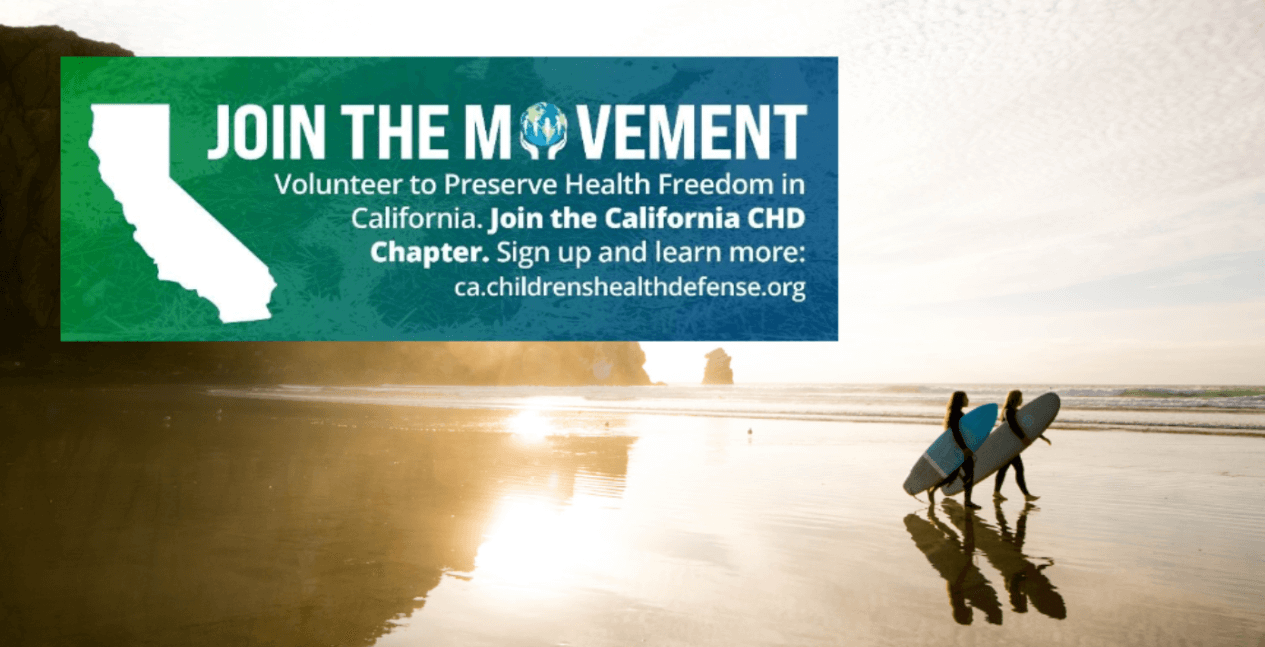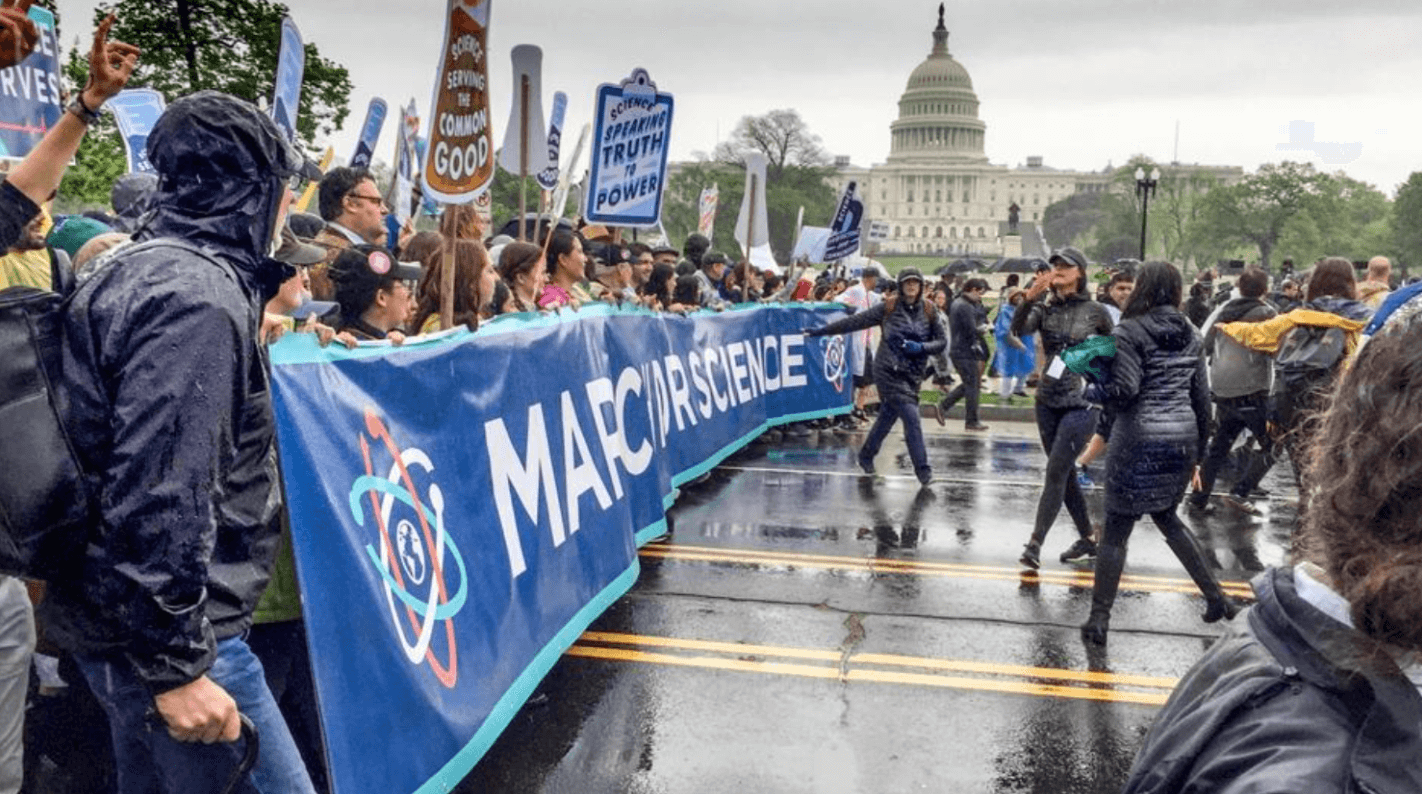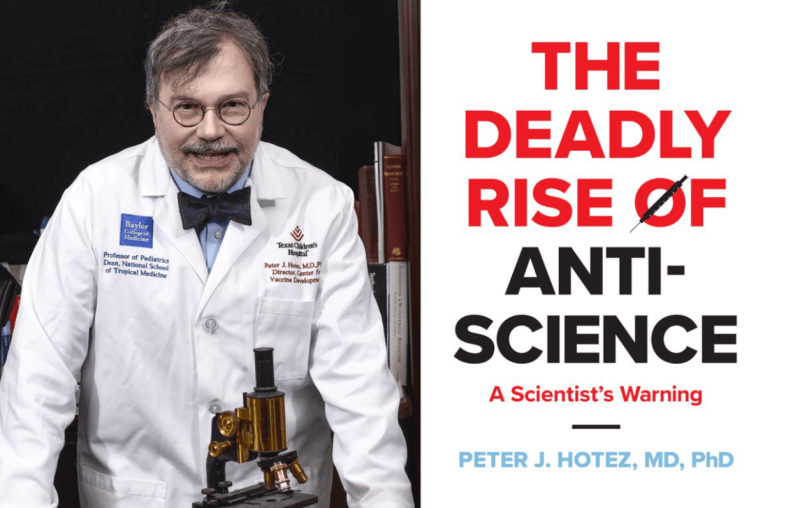If I don’t write this or stand up for vaccines, then who will?
That is what motivates the activism of prominent academic vaccine researcher Peter Hotez, M.D., Ph.D., and drove him to write, “The Deadly Rise of Anti-Science,” published by Johns Hopkins University Press.
A pediatrician and developer of vaccines for neglected infectious diseases in low- and middle-income countries, Dr. Hotez, in his iconic glasses, beard, bowtie, and wearing a perpetual smile, has become a media darling or devil — a steadfast defender and hero of science for mainstream news outlets, but a target of attack by the right.
Hotez has a storied history of fighting anti-science rhetoric. He has long been under attack due to his efforts to challenge a common trope of the anti-vaccine movement — the repeatedly and persuasively debunked claim that there is a causal link between vaccines and autism. His own daughter is autistic, which was the impetus for his 2020 book, “Vaccines Did Not Cause Rachel’s Autism.” As Hotez put it in his current book, “By circumstance, I became an anti-science expert.”
The yearslong defense of one of the greatest achievements of modern medicine — vaccines to prevent infectious diseases — induced Hotez to report and reflect on the underworld of vaccine disinformation and its politicization. The anti-scientific — and hugely lucrative — assaults on the COVID vaccines further spurred his efforts.
Battles with anti-vaxxers
The Deadly Rise of Anti-Science begins with a regurgitation — a term we use advisedly — of the vitriolic attacks via email or social media that have been leveled at the author over the years. This statement on page 2 resonates with many scientists, including the two authors of this review:
…when I decided back when I was an adolescent that one day I would become a scientist, I never imagined a segment of society turning against me or my scientific colleagues.
Being derided as a “Pharma-shill” despite working to develop not-for-profit vaccines for the world’s poor, is at the mild end of what Hotez calls “anti-science aggression.” The death threats fall into a more extreme category.
Hotez walks us through his experiences clashing with the anti-vaccine movement, which was reinvigorated by the COVID-19 pandemic. He cites insults from the “Disinformation Dozen,” which includes several rogue physicians who have embraced pseudoscience, a bodybuilder, a wellness blogger, a religious zealot, and Robert F Kennedy Jr., who heads an anti-vaccine organization. He has also endured personal insults from Florida Governor Ron DeSantis, Representative Marjorie Taylor Green (R-Ga), and former Fox News anchor Tucker Carlson. Hotez also discusses the spread of disinformation across borders — for example, to the anti-vaccine Freedom Convoy of Canadian Truckers in January 2022, to other similar movements in the EU, and eventually into low- and middle-income countries.
Chapters 2 through 6 are particularly valuable for readers with little knowledge of American history or politics.
In Chapter 2, Hotez outlines the origins of the Health Freedom movement and its contribution to science misinformation in America.

Robert F. Kennedy, Jr.’s Children’s Health Defense recruits anti-vaxxers
Chapter 3, aptly entitled “Red COVID” (as in red, or Republican-controlled, states), details how the U.S. became ground zero for COVID deaths and outlines the failure of the American healthcare system to protect its citizens through vaccination. Hotez estimates that 200,000 Americans needlessly lost their lives despite widely available safe and effective COVID-19 vaccines.
“One of the sadder aspects of the COVID-19 pandemic occurred among those who were hospitalized after they refused to get vaccinated, including those who expressed utter disbelief that they might die from their illness,” he laments.
The poisonous web of anti-vaxxers
Chapter 4 covers the anti-science political ecosystem that has sprung up and is sustained by social media, red-state courts, and ultraconservative news outlets. Some additional examples of that phenomenon — in Dr. Hotez’s home state, no less — are further discussed here in an article by one of us (Dr. Miller).
Chapter 5 illustrates that personal attacks by people like former Republican member of the Texas House of Representatives Jonathan Stickland (who described Hotez as resembling Hitler and Stalin), and similar denunciations of then-NIAID Director Tony Fauci by Florida Governor Ron DeSantis, and U.S. Senators Ted Cruz (R-Tex) and Rand Paul (R-Ky) do, indeed, make it “A Tough Time to be a Scientist.”
Chapter 6, ‘The Authoritarian Playbook,’ follows the history of science disinformation in Stalinist Russia. Hotez describes Stalin’s “Doctor’s Plot” conspiracy of 1953; and the replacement of Nikolai Vavilov (a prominent Russian geneticist who was starved to death in prison) with Trofim Lysenko, a delusional Lamarckian nitwit who had favor with the regime and whose unscientific agricultural policies led the nation into massive crop losses and devastating famines.
Hotez also touches upon countries leaning toward authoritarian policies today, such as Hungary and Brazil, as well as the great Russian anti-vaccine disinformation machine, composed largely of computer-generated bots and trolls, which strives to destabilize the world’s democracies and injure their populations.
The final two chapters contain a warning and a list of actions that scientists and like-minded individuals can take to curb the science rejectionist movement before it does even more damage.
Prescription for the future
For a start, Hotez advocates that more science communication training be taught at universities. There are institutional allies, including Vaccinate Your Family, This Is Our Shot, and Voices for Vaccines. Other vaccine advocacy groups are based at universities and hospitals: the International Vaccine Access Center at the Johns Hopkins School of Public Health, the Vaccine Education Center at Children’s Hospital of Philadelphia, the Stanford Internet Observatory, and MisinfoRx, a toolkit for healthcare providers in place by the Harvard Global Health Initiative, Harvard Kennedy School, and the University of Michigan School of Information, among others. Many of them are supported by the U.S. government.
It was also uplifting to be reminded of the successful March for Science, held in Washington DC in 2017. Still, Hotez fears that the U.S. government regards opposition to anti-science aggression both within our borders and internationally as a low priority.

Hotez’s book concludes with a sense of urgency. Lives remain in the balance, as cases of measles and even polio reappear in U.S. cities. Meanwhile, threats against scientists themselves or attempts to “cancel” their scientific careers are increasingly menacing.
He calls for a fundamental shift in our academic culture toward one that incentivizes scientists to engage with the public, and for a change in evaluation metrics to encourage science outreach. Hotez considers the Southern Poverty Law Center a model for those under attack from anti-science aggression, and discloses that he has obtained support from scientific and professional societies such as the Committee of Concerned Scientists and the Climate Science Legal Defense Fund. Why not, he asks rhetorically, create a defense fund for vaccine scientists that could be used to collect information on activists’ attacks and trolling?
The anti-vaccine movement is a manifestation of our highly politicized and polarized world, combined with easy access by armchair experts (read: know-nothings) to popular social media platforms. That movement is not new (except for the ubiquity of social media) but boasts a long history in this country. However, during the COVID-19 pandemic, it grew to nearly insurmountable proportions.
Hotez capsulizes the current state of affairs thusly: “A survey conducted by Science magazine found that almost 40% of COVID-19 scientists reported attacks via email, social media, or phone, or even physical confrontations.” (We are among them.)
Historically, the members of the scientific academy have striven to explore the natural world, and, in myriad ways, to improve it and the lives of its inhabitants. Scientists have not been trained to engage with the public, to defend themselves and their research against aggression, and to combat disinformation. Scientists also have a history of, for the most part, steering clear of politics. All of this is no longer possible in today’s world.
We need an infrastructure to assist scientists in their desperately needed ancillary role as science communicators. Peter Hotez, with his trademark professorial appearance and willingness to take on the troglodytes, offers direction to achieving these new goals. We hope that scientific institutions will take heed and follow.
Kathleen L. Hefferon is an instructor in microbiology at Cornell University. Find her on X @KHefferon
Henry I. Miller, a physician and molecular biologist, is the Glenn Swogger Distinguished Fellow at the American Council on Science and Health. He was the founding director of the FDA’s Office of Biotechnology. Find Henry on X @HenryIMiller































